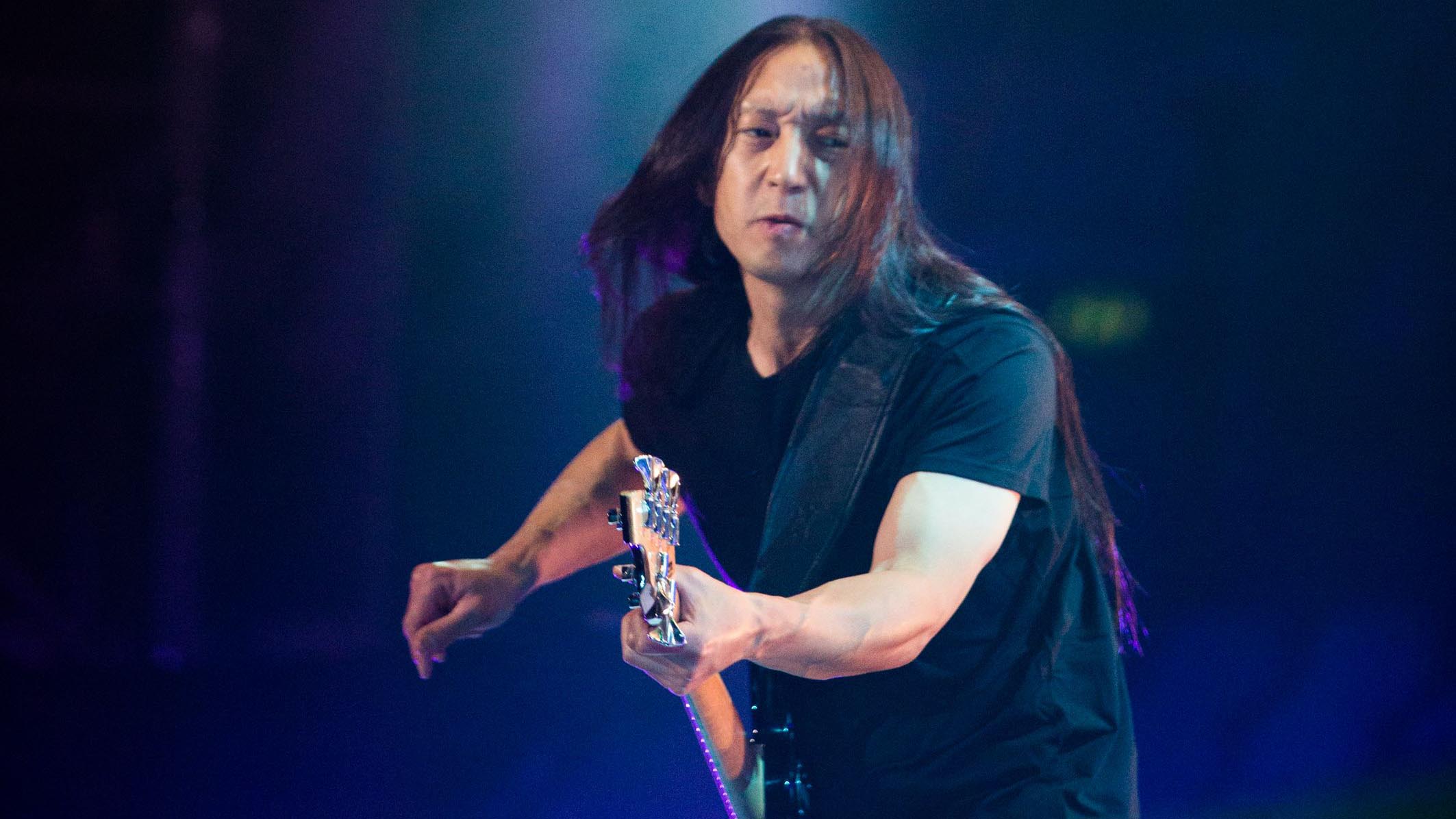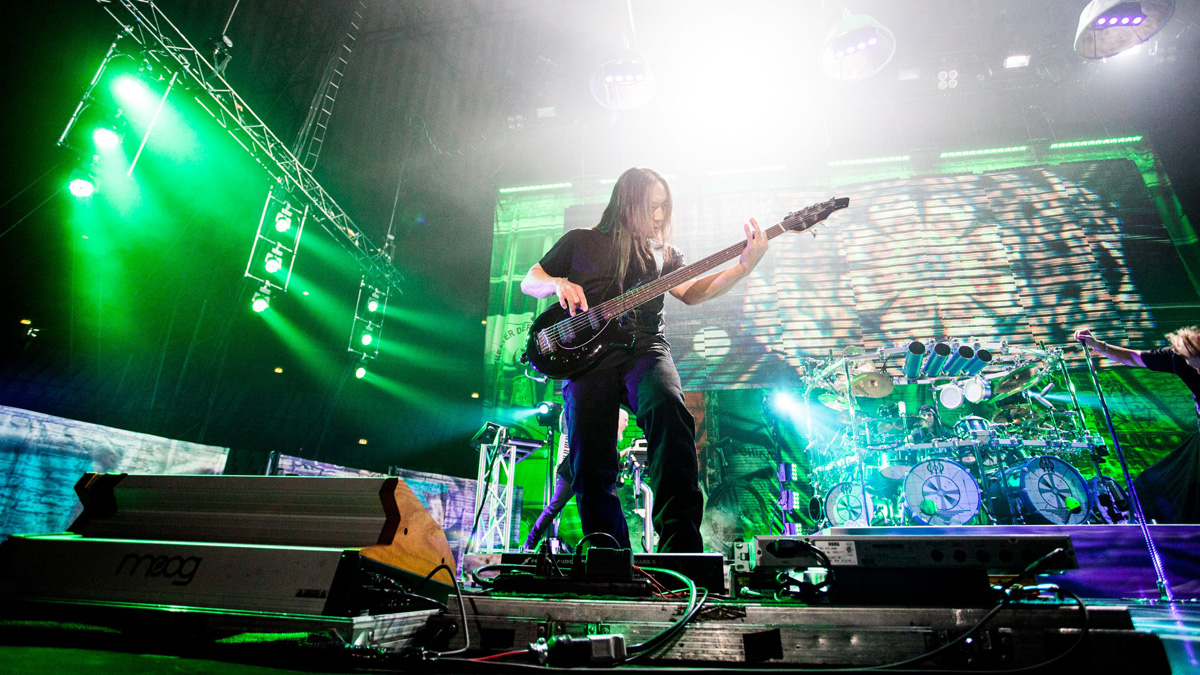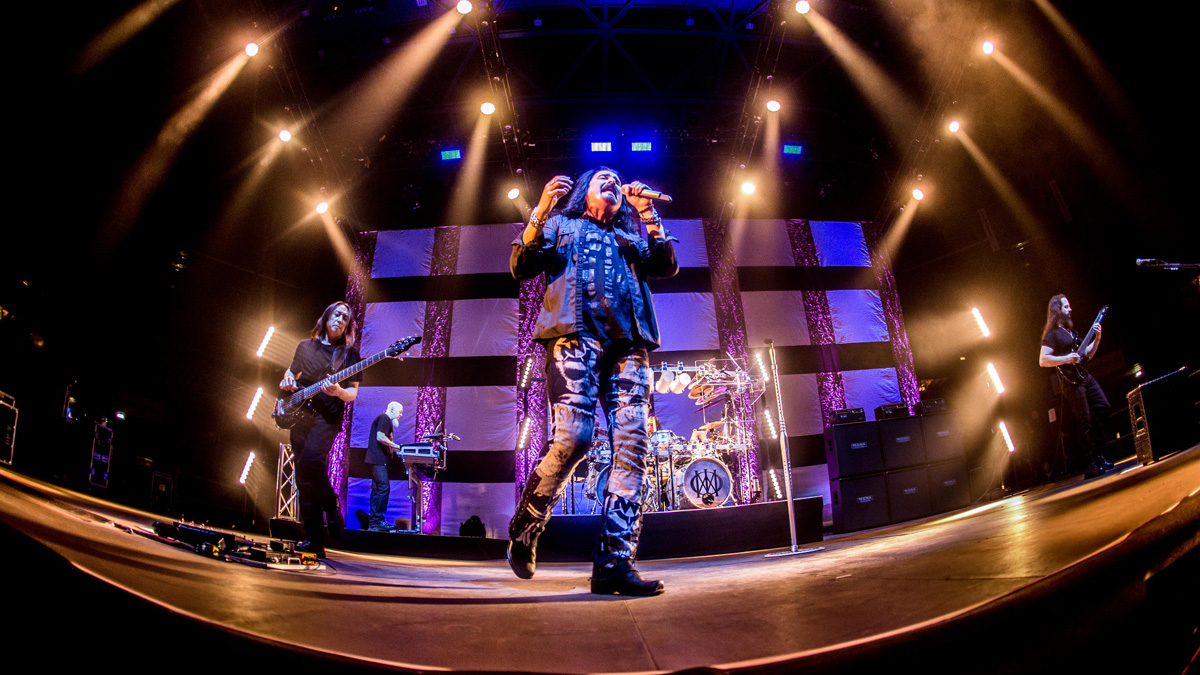Dream Theater's John Myung: my top 5 tips for bassists
Bass virtuoso shares his knowledge

5 tips from a master
It’s early afternoon and we’re at Dream Theater’s chosen hotel, just a stone’s throw away from Birmingham Symphony Hall, the venue for the latest stop on the tour promoting 2016’s acclaimed The Astonishing album.
It's around two hours away from the band’s soundcheck and we’re sat with the band’s virtuoso bass player John Myung. As we chat with the softly spoken, affable Myung, it transpires that we must have caught him on one of the very few parts of the day when he doesn’t have his beastly six-string bass in his hand.
He explains to us that a show day means an hour-long soundcheck and a mammoth two-and-a-half-hour warm-up session (plus practice time if he can fit it in).
But it’s not just putting in the man hours that has made Myung a master of the instrument; we quickly find out as much when we ask him to pick out his top five tips for bass players.
We start with quite the opposite message, the need to take a break when you’re in the thick of the action…

1. Don't burn yourself out
“On the road, you can definitely burn yourself out. Touring is quite an unnatural thing that you put yourself through. It’s good that we take breaks in between legs of tours to rejuvenate.
“Night after night you are constantly pushing yourself. Our shows tend to be about two-and-a-half to three hours, and that’s just the show, not counting soundcheck, warm-up and all of the preparation. With everything there is a saturation point where you need to pull back a little bit.”

2. Simplify six-string
“If six string bass interests you, you could always see it as a four-string and play it as a four-string. That’s always how I saw it.
“The extra strings are there for creative purposes. You will accidentally hit a note that wasn’t normally available on a four-string and it might really sound cool.
“Things like that happen all the time where you’re working on something; As I Am was like that, I was just playing something and the availability of the extra string means you will naturally use it. That’s where the creativity comes in.
The extra strings are there for creative purposes. You will accidentally hit a note that wasn’t normally available on a four string and it might really sound cool.
“For me, I tend to favour six-strings with a narrower neck. I was playing wide-spaced Fender six-strings and they proved to be way too taxing on my hands. I asked Music Man to make me a six-string while utilising the width of a five-string neck, and that seems to work for my hands.
“If you go for a six-string, maybe go for something that has a reasonable width to the neck. Playing those basses with the larger spacing can be like playing an upright bass, and there’s a whole different physicality there. To play something like that night after night I need something that will work a little bit with me.
“Picking a bass, though, is a very personal thing. It’s like thinking about what kind of car you like; it is a very personal choice: do you think it is cool, does it agree with you. It can be hard. Six-string is definitely cool and it has its own energy to it; it makes you play differently.”

3. Keep your discipline
“If I had to give some real, real advice, one of the things that is the most obvious thing, but it tends to be overlooked, is being able to feel like you are consistently improving and evolving, and staying in touch with the instrument is very important.
“A key part of that is focusing on how much time you can put into playing every day, whether that be an hour a day or two hours, three hours or whatever. You need to maintain that window of saying, ‘Okay, from this hour to this hour this is what I’m going to do.’
I try to play at least three hours a day. I have a family and responsibilities at home, so I tend to try to get that playing out of the way as early as possible
“You need to maintain that discipline and schedule. That really is the most important thing. It could be listening to a new album that you haven’t listened to or focusing on technique; it is all just about putting in the time to allow yourself to evolve.
“You don’t need to concentrate on trying to evolve too quickly. When I was younger, I think there was a tendency to psych yourself out. Learning an instrument isn’t supposed to take a week or a month; it takes a handful of years or even a decade to realistically get where you want to be.
“If someone had told me that when I was first starting out, and if I had listened to them, then that would have been the biggest foundational piece of advice that I could have taken.
“I try to play at least three hours a day. I have a family and responsibilities at home, so I tend to try to get that playing out of the way as early as possible. I’ll try to get it done in the morning and then after that the rest of life can take over. This way I feel better about myself as long as I get that three hours of working on something in each day.”

4. Prepare for your live show
“Today, we will leave the hotel at around 3pm, we will soundcheck between 4pm and 5pm and the show starts at 8pm. Between that and dinner I will try to squeeze in two to two-and-a-half hours of warming up.
“That takes the difficulties out of playing when you’re warmed up. That way, you’re in tune and everything is in place, your mind is working, your hands are working. That’s why I do that. I warm up right up until we go on stage. I like to warm up as much as possible.
Putting in the prep time and being prepared is so important when you’re playing live. That is half the battle
“Usually half an hour before the show starts, I will wander towards the stage and talk with my tech and make sure everything’s up and running and the levels are good.
“Putting in the prep time and being prepared is so important when you’re playing live. That is half the battle. Being comfortable with the whole live atmosphere comes with experience.
“I was reading recently an article that showed the correlation of how fast your heart is beating and the impact that has on your senses, how you see and how you hear. If you're really nervous you tend to lose half your hearing and your peripheral vision is also lost.
“Playing live, your heart rate definitely comes up, and that can make things sound different. So, the more prepared you are when playing live, the better off you will be. I’ve been there, we’ve done some awesome shows with lots of people there.
“We played with Iron Maiden in Canada to 80,000 people. We walked out and you feel the energy. The fact that we are so well-rehearsed makes it autonomous when we step out there. That’s what you want to shoot for.”

5. Find your space in the sonic mix
“You need to use gear in the studio that sounds good when it's plugged directly into the board without any kind of effects.
“Your gear needs to work well on that level. Then, all of that other stuff will help you fine-tune the sound to bring it into the audio landscape when all of the other instruments are mixed in.
“There’s a lot of competition that goes on once everything is mixed and the instruments are trying to be heard. There’s only a certain set of frequencies, and the art of bringing that instrument to life within those frequencies is where your gear choices come into play.
“For me, working with the Demeter valve preamps and bass preamps and the tube mic preamps has lent itself well to recording bass.”
Rich is a teacher, one time Rhythm staff writer and experienced freelance journalist who has interviewed countless revered musicians, engineers, producers and stars for the our world-leading music making portfolio, including such titles as Rhythm, Total Guitar, Guitarist, Guitar World, and MusicRadar. His victims include such luminaries as Ice T, Mark Guilani and Jamie Oliver (the drumming one).

